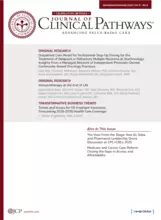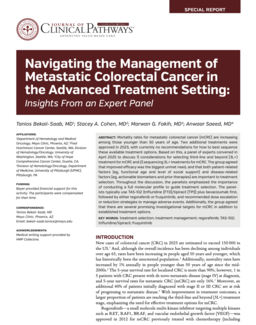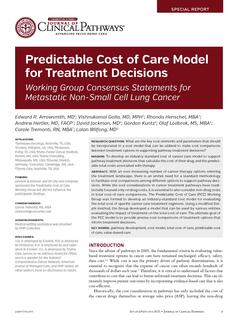Modification of PARP Inhibitor Use in mCRPC With Co-Occurring BRCA1/2 Mutations and MSI-High Status
Background
The US Oncology Network’s Value Pathways powered by NCCN Prostate Cancer Pathway was recently updated to reflect evidence regarding the limited efficacy of poly (ADP-ribose) polymerase inhibitors (PARPi) in patients with co-occurring BRCA1/2 mutations and microsatellite instability-high (MSI-H) status. This change was prompted by findings from Sokol et al, which demonstrated that BRCA1/2 mutations in MSI-H tumors are predominantly monoallelic and not associated with homologous recombination deficiency (HRD), a key determinant of PARPi sensitivity. These monoallelic mutations are considered bystander mutations and do not confer the same therapeutic vulnerability as biallelic alterations. Pembrolizumab, an immune checkpoint inhibitor (ICI), is approved by the FDA and included in NCCN Prostate Cancer Guidelines as a therapeutic option for patients with MSI-H tumors.
Methods
Biomarker results and treatment decisions are documented through Clear Value Plus (CVP), a clinical decision support (CDS) tool. To assess the impact of this pathway update, we conducted a retrospective review of treatment decisions in patients with mCRPC receiving treatment for 1st line through 7th line or greater between August 2023 through April 2025. Structured data was accessed from an electronic health record used by The US Oncology Network. Patients had concurrent BRCA1/2 mutations and MSI-H status. We compared the use of PARPi and immune checkpoint inhibitors (ICIs), specifically pembrolizumab, during the 9 months preceding and 12 months following the implementation of this change. The primary objective was to evaluate clinical practice alignment with the updated guidance and to observe differences in therapeutic selection.
Results
In the evaluable time prior to the pathway revision (August 2023 through April 2024), 19 patients were identified with co-occurring BRCA1/2 mutations and MSI-H status. Among these, 6 (32%) received a PARPi and 7 (37%) received pembrolizumab. Following the update (April 2024 through April 2025), 15 patients met the same criteria, with only 2 (13%) receiving a PARPi and 7 (47%) receiving pembrolizumab. This represents a 58% reduction in PARPi use and a 30% increase in pembrolizumab administration where pembrolizumab is more likely to provide clinical benefit compared to a PARPi.
Conclusions
The removal of PARPi from the Prostate Cancer Pathway for patients with co-occurring BRCA1/2 mutations and MSI-H status led to a measurable decline in PARPi use. This shift is consistent with emerging evidence that BRCA1/2 mutations in MSI-H tumors lack HRD and PARPi sensitivity. Despite being documented a year after the published data from Sokal and colleagues, pre-pathway revision prescribing patterns remained inconsistent with published results, reinforcing that the pathway update had an impact on the change in treatment decisions. These findings also underscore the importance of integrating genomic context into CDS and support the continued refinement of value-based care pathways in oncology.
Author Information
Authors:
Steven Gilmore, PharmD, BCOP1; Aimee Ginsburg, PharmD, BCPS1; Victoria Handy, PharmD, BCOP1; Daniel Rubin, PharmD, BCOP1;Stephen Clark, PharmD, BCOP1; Dhaval Shah, MD, MBA, FACP2
Affiliation:
1The US Oncology Network/McKesson; 2Medical Oncology Hematology Consultants
References
- Sokol ES, Jin DX, Fine A, et al. PARP inhibitor insensitivity to BRCA1/2 monoallelic mutations in microsatellite instability–high cancers. JCO Precis Oncol. 2022;6:e2100531. doi:10.1200/PO.21.00531.
- National Comprehensive Cancer Network. NCCN Clinical Practice Guidelines in Oncology (NCCN Guidelines): Prostate Cancer. Version 2.2025. Published April 16, 2025. Accessed July 25, 2025.















